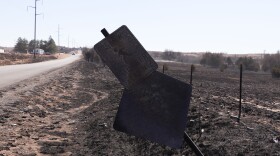But Boismier said the fight isn’t over yet.

“I see this as a much larger fight beyond just me versus [State Superintendent Ryan Walters] or me versus [the State Board of Education], kind of situation,” Boismier said. “So what our next steps would be, essentially, is to move this fight from the classroom to the courtroom.”
Boismier didn’t yet have a timeline for filing for a judicial review, but hopes to move forward soon.
After the board meeting, Walters told reporters the move from the board was an attempt to hold teachers accountable “if they do things that operate outside the law.”
“She broke the law, you know,” Walters said. “And I said from the beginning, when you have a teacher that breaks the law, says she broke the law, says she’ll continue to break the law, that can’t stand.”
However, in August 2023, a state department hearing officer concluded, after reviewing evidence and testimony, there was no evidence to show Boismier violated the Standards of Performance and Conduct for Teachers or Oklahoma Administrative Code concerning certain discussions of race or sex in the classroom — more commonly known as House Bill 1775.
The policy says the board must “prohibit discrimination on the basis of race or sex in the form of bias, stereotyping, scapegoating, classification, or the categorical assignment of traits, morals, values or characteristics based solely on race or sex.”
House Bill 1775 went into effect in the summer of 2021, and since then, Tulsa and Mustang Public Schools’ accreditation statuses have been downgraded due to violations. While the law’s authors say the bill language is not vague or overly restrictive, teachers say it has created a chilling effect in the classroom around having hard conversations pertaining to history and culture.
According to the hearing officer’s review, obtained by StateImpact, Boismier covered her classroom bookshelves in red bulletin board paper, with “Books the state doesn’t want you to read,” written on it. The QR code was taped to the paper.
The code linked to the website of the Brooklyn Public Library, where students could apply for a free library card. The library’s Books Unbanned program offers library cards to teens and young adults and is a “response to an increasingly coordinated and effective effort to remove books from library shelves,” according to its website.
While the state department provided excerpts of three books from the “banned books” list, the hearing officer concluded there was no evidence Boismier used the books in classroom instruction, shared the books with students, encouraged students to read the books, or that students accessed, attempted to access or were provided access to the books.
Ultimately, the hearing officer recommended Boismier’s certificate not to be revoked.
Boismier said she doesn’t understand the purpose of the hearing officer’s recommendation if it was going to be ignored.
“It feels a little like, to me, shaking a magic eight ball,” Boismier said. “And the board got to shake it more than once because they didn’t get the result they wanted to begin with.”
Boismier’s teaching certificate was set to expire this summer, and she said she applied for renewal in May. But the state department sent her an email saying they would not renew her certificate until a decision was made on her case. Between then and the Aug. 22 meeting, her certificate expired.
Because her certificate is now expired, she is not eligible for an expedited certification process, or “interstate reciprocity,” if she wants to return to the classroom in another state like New York, where she now lives. Additionally, she’s concerned about the stain a revocation leaves on her record.
“No matter where I go… if I decide to teach in a classroom, the fact that I have now had a certificate revoked does matter,” Boismier said. “On the application that you’re going to fill out whenever you apply for any school classroom job… there’s that box that you have to check that says, ‘Have you ever had a certificate suspended or revoked?’ I will have to check that box. There is no space on that application to explain why. So effectively, this locks me out of the teaching profession entirely.”
Boismier said the saga with the state board has been emotionally taxing and made her the target of harassment and death threats. But, she said, what she struggles the most with is making sure she takes the “right steps” to support teachers and students.
“I understand what the stakes are for my colleagues who are in classrooms right now and can’t recommend book titles to kids who want to read,” Boismier said. “I understand what it’s like to be afraid that a single text on your classroom library shelf, a single errant comment, like, ‘Hey, you should read this book if you like this one,’ could ultimately, as we’ve seen, now result in a revocation of your license.”
Boismier’s advice for teachers trying to navigate controversial classroom restrictions was measured. She said while she has certain privileges, she acknowledged not all teachers are able to be outspoken.
“For me, it was never a question of whether or not I would do this, but when. Many of my colleagues cannot say the same because they have livelihoods on the line that others depend on,” Boismier said. “So what I would say to them, I think, would be, ‘Do whatever you can, in whatever way you can, to affirm who your students are, who they’re becoming, and to do your job the way that you know how to do it.’”
StateImpact Oklahoma is a partnership of Oklahoma’s public radio stations which relies on contributions from readers and listeners to fulfill its mission of public service to Oklahoma and beyond. Donate online.








